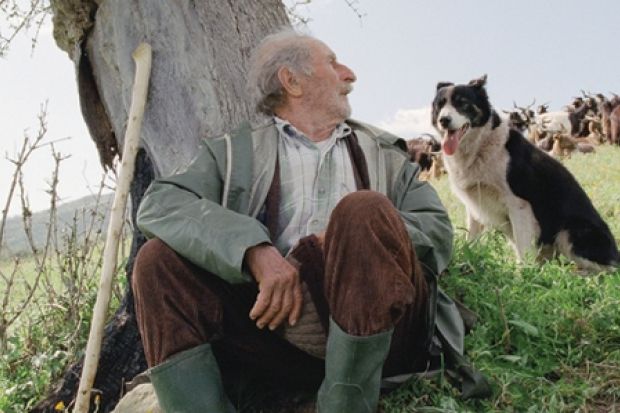Le Quattro Volte
Directed by Michelangelo Frammartino
Starring Giuseppe Fuda, Bruno Timpano and Nazareno Timpano
Released in the UK on May
This is probably racist, but the thought won't go away. Why are Italians so good at film-making? Does it have something to do with their gift for interior decoration, tailoring, car design and ice-cream making? And why are they good at those things? A hedonistic sensibility? An inherited love of bright colours? Whatever the explanation, Le Quattro Volte (The Four Times) throws fuel on the fire.
It takes its title from a maxim by Pythagoras, which argues for our journey from human to animal, vegetable and finally to mineral: "Thus, we must know ourselves four times." Besides a discussion of the transmigration of souls, the press kit contains an essay on coal-burning and Calabrian culture - all of which indicates how eccentric a film this is. In truth, one need know nothing about Pythagorean philosophy to enjoy it; regard it instead as a portrait of the vanishing culture of the Serre, the mountainous area in the province of Vibo Valentia.
The plot is simple. Le Quattro Volte begins with an aged goatherd who drinks the dissolved dust from the floor of the local church, believing it to be a cure-all. One day he dies and his goats enter his home to keep watch over him. His soul migrates into a kid goat which one day becomes separated from the herd and finds its way to a large tree, where it dies. The soul of the goat enters the tree, which is chopped down and used by the villagers in their yearly fertility rite. Afterwards, it is sold and turned into charcoal.
I wouldn't normally provide the synopsis of the entire film, but in this case I think that to know what happens is more likely to intrigue potential audiences than turn them away. For it is not a plot in the usual sense, and one's enjoyment of the film isn't dependent on it.
The result, even for non-Pythagoreans, is a refreshingly pure piece of cinema, not just because it tells its story without dialogue, but because it manages to make its four episodes appear as though filmed from life. It has been called a documentary, but there are three credited actors in it. Even so, it is extraordinary for its extreme naturalism. The humans, animals and insects who fill each frame appear supremely indifferent to the camera.
Every shot contains something that will seize your attention, whether it be the opening image - of smoke rising off an unknown landscape - or an ant crawling across an old man's face or the sight of a goat standing on a table. Yet the film can also be outlandishly dramatic, as in an extended shot from a single vantage point, when director Michelangelo Frammartino documents the passing of the old goatherd in a scene involving a sheepdog, goats, a re-enactment of the Crucifixion and three men dressed as Roman centurions.
There are documentary elements here, including the portrayal of the Pita festivities, a pagan fertility rite involving the felling of a tree, and the visual portrayal of how Calabrian charcoal burners go about their business. But these various parts, fiction and non-fiction, are structured so as to conduct us on a cosmic journey across the four states of being.
This is an original, engaging and moving film regardless of its Pythagorean agenda, which is claptrap of a peculiarly Italian kind (the philosopher was apparently resident in Calabria). Who could resist a film with a herd of goats as its stars, and whose only human actors are shown at a distance? The average goat has more charm than Julia Roberts or George Clooney and is more amusing to watch.
Some are clearly insane (one has only to listen to their bleating to be reminded of that), but even their noises are less irritating than those of the average English professor. During the course of the film we watch goats climb on to banks at the side of the road, wander the countryside and play with each other in their stall. A 90-minute film showing little else would be more entertaining than most.
Frammartino says he was "given" his film, and "did not will it through my own pre-existing idea". If by that he means it has a vision and a spirit that arise as much out of its subject matter as from his conscious deliberation, I think I see what he means. Either way, Le Quattro Volte will delight you from the first frame to the last. Miss it at your peril.
Register to continue
Why register?
- Registration is free and only takes a moment
- Once registered, you can read 3 articles a month
- Sign up for our newsletter
Subscribe
Or subscribe for unlimited access to:
- Unlimited access to news, views, insights & reviews
- Digital editions
- Digital access to THE’s university and college rankings analysis
Already registered or a current subscriber? Login
